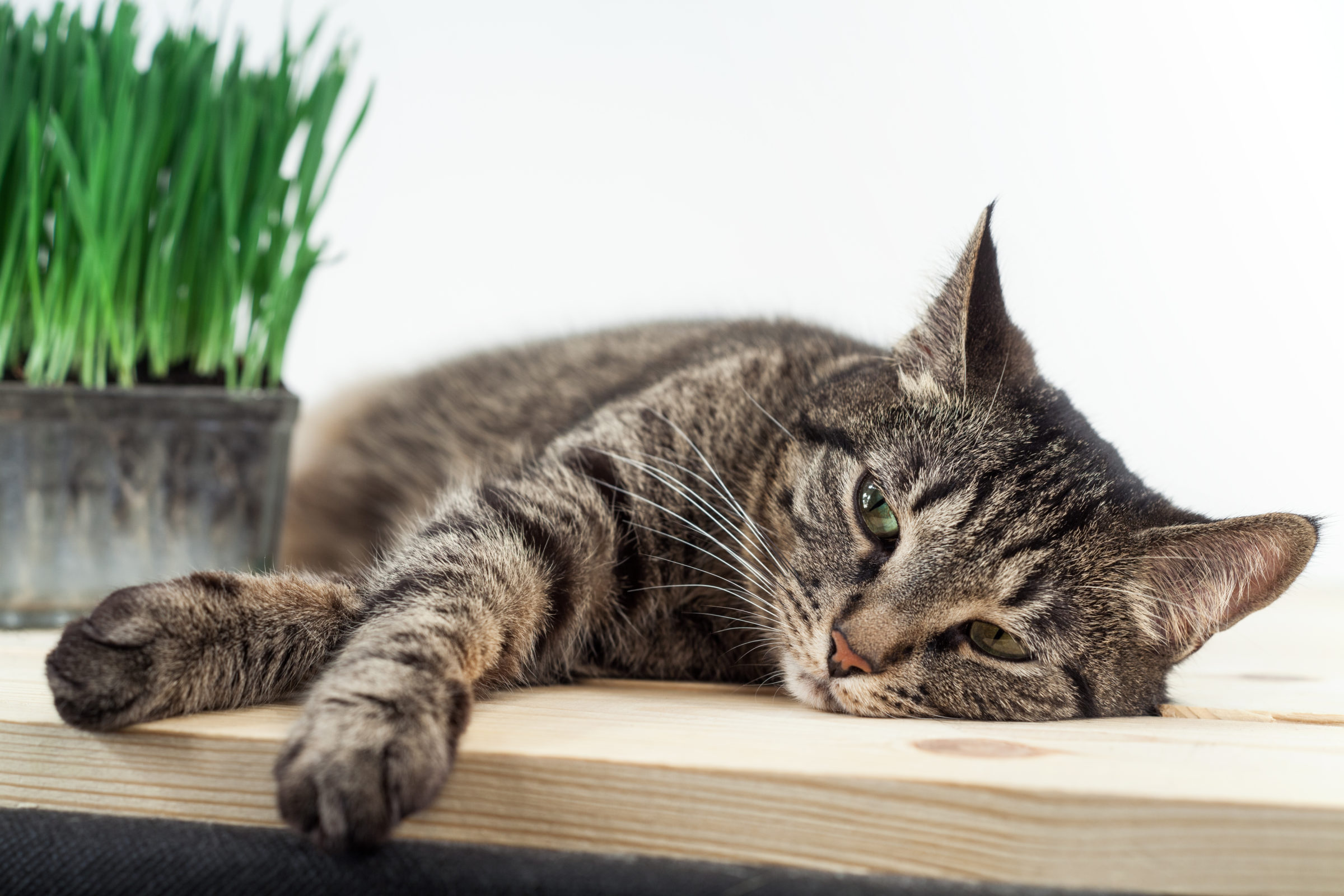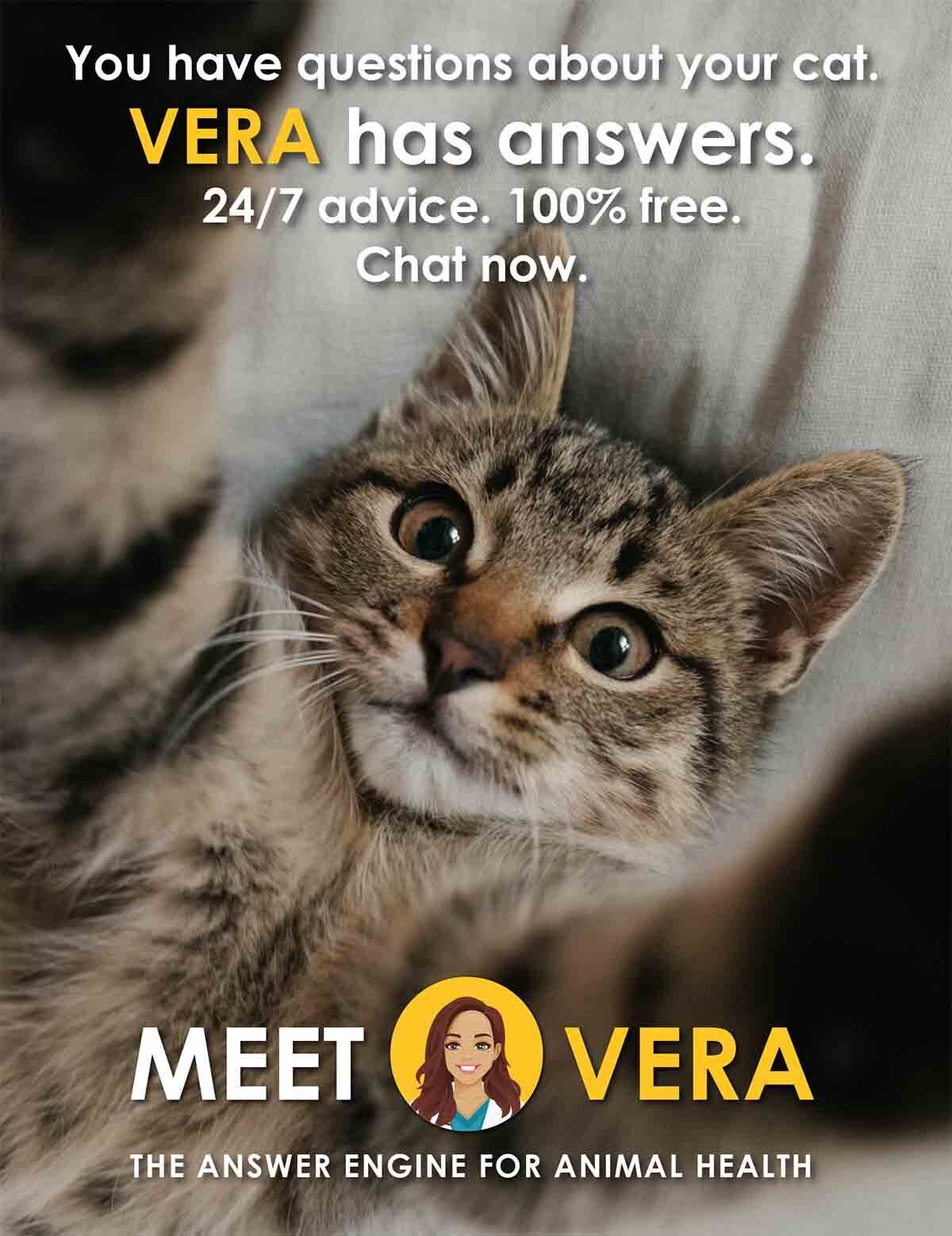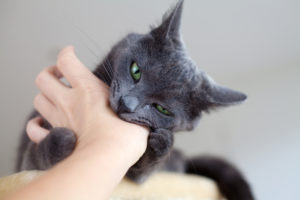As a cat lover, you know that dreaded sound: “hork-hork-GACK!” Your cat has just vomited—and hopefully not on your good carpet! While you’re cleaning up the mess, you start to worry—”Why did my cat vomit? Is my cat sick? Should I call my veterinarian?”
At AskVet, we’re here to help you decide when to seek veterinary care, and to help you start narrowing down the list of possible reasons why your cat may be vomiting.
Wait…Isn’t it normal for cats to vomit?
Many cat guardians are under the impression that cat vomiting is no big deal. They’ve been told that vomiting up hairballs and vomiting occasionally is a normal part of cat life….but is it really? Surprisingly, the answer in most cases is NO—it is not “normal” for your cat to vomit. Continue reading for more information about what might make your cat vomit and why, as well as when to talk to a trusted veterinarian.
Cats Vomit from Abnormalities in the Gastrointestinal Tract
It can be helpful to separate the causes of vomiting into two broad groups: problems within the gastrointestinal tract (which includes the esophagus, stomach, intestines, and colon), and problems outside of the gastrointestinal tract that make kitties nauseous.
Don’t Eat That!
While cats are usually notoriously picky eaters, they can still scarf down things that cause an upset tummy. If your cat spends time outside, this could be a prey animal—such as a bird, lizard, or mouse. Even indoor cats can ingest bugs and other creepy-crawlies that make them nauseous and vomit. When this happens, usually cats will vomit once or twice but otherwise feel and act normally.
However, cats can become sick from certain bacteria present in prey animals (“songbird fever” is another name for salmonella infection in outdoor cats). Your kitty can also pick up intestinal parasites from swallowing prey animals and insects (including fleas!) which lead to vomiting and diarrhea, too! Fortunately, parasites are usually easily diagnosed and treated, but can make your cat quite sick until the problem is fixed.
Cats can also swallow toxic substances (including antifreeze and chocolate), just like dogs–so even if you suspect that your cat’s predatory behavior is the cause of your cat’s vomiting, it’s important to keep an eye out for other symptoms. Cats are notorious for chewing on indoor and outdoor plants too, often resulting in vomiting. Some plants just cause a mild upset stomach, but occasionally curious kitties accidentally sample toxic plants too (like lilies!) and can become very sick. Ingestion of lilies can be life threatening and requires immediate veterinary care.
Whether indoors or outdoors, any cat can swallow other non-food items like plastic, toy pieces, and fabric strings. Since these cannot be digested, they may get stuck and cause a life-threatening condition.
Cats with an intestinal obstruction from swallowing a non-food item will have repeated episodes of vomiting, and eventually stop eating and become lethargic. Emergency surgery is usually required to relieve them of the obstruction, and this becomes more risky as they become more ill—so timely treatment is important!
The Dreaded Hairball
As cat lovers, we have all cleaned up that tube-shaped clump of hair and stomach contents after our kitty has coughed up a hairball. While an occasional hairball can be normal, especially in longer-haired felines, they should still be a “few and far between” occurrence. If your cat is vomiting up hairballs more often than once a month, then she may be overgrooming due to itchy skin or anxiety, or her gastrointestinal tract may be having difficulty moving things along. It’s best to see your veterinarian if you are noticing frequent hairballs—even if your kitty is otherwise acting normally.
Food Sensitivity
At AskVet, we frequently speak with cat owners who are concerned that their cat’s vomiting may indicate they need to change foods.. This is a very reasonable question, especially in light of how many pet foods are available and how they are marketed!
The most common food-related cause of vomiting in cats is the “scarf and barf”—when your kitty devours his food quickly, and then vomits up the undigested food within the next half an hour or so. If this is the ONLY time that your cat vomits, then try to slow down her eating first and see if that fixes the problem. This may be as simple as adding some water to your cat’s food (see our article on “dry versus canned food in cats”), or using puzzle and foraging tools to prolong your cat’s eating experience. (Note: these toys are also wonderful for your cat’s mental health!)
Surprisingly, some cats who eat dry food will vomit if the kibble is a certain shape (such as round pebbles), and not vomit if they are fed another shape (such as triangles). If you recently switched your cat’s kibble shape, then this might be the cause of your cat’s vomiting.
Cats can have allergies or sensitivity to the protein source in their food (for example, fish-based protein versus chicken-based), too—though this is relatively uncommon. If your veterinarian thinks your kitty might have a food allergy or sensitivity, they may prescribe a special diet with a novel protein source that your cat hasn’t eaten before, or even a hydrolyzed protein diet.
AskVet Tip: When changing your cat’s diet to a new brand, variety, or even opening a new bag of food, a slow transition is recommended to help your cat’s stomach and intestinal tract adjust to the new food. Cats can be very sensitive to diet changes! A gradual transition over 1-2 weeks, adding the new diet to the old food can help alleviate some of the possible tummy upset that can occur from introducing a new food. It is recommended to introduce the new diet by offering 25% more every 2 days, and simultaneously phasing out the old.
Inflammatory Bowel Disease
Sometimes, cats will develop inflammation of their stomach and intestines because their body is attacking the normal cells in these organs. This inflammation leads to nausea and vomiting, diarrhea, or both. Sometimes, the only symptom of inflammatory bowel disease that we see is weight loss from the decreased absorption of nutrients that occurs with the inflamed organs.
The only way to diagnose this disease is by looking under the microscope at small pieces of the stomach and intestines, which requires your veterinarian to perform biopsies. Since this procedure is expensive and somewhat invasive, your veterinarian will likely rule out other causes of long-term vomiting in your kitty before recommending testing for this condition.
Cats Vomit from Problems Outside the Gastrointestinal Tract
How can a problem outside of the gastrointestinal tract cause a cat to vomit? Great question! The sensation of nausea is complex and involves multiple organs—but always ends in your cat’s brain. The short answer is that anything that triggers the brain’s “vomiting center” will cause a cat to vomit.
These triggers can come from toxins that build up in the bloodstream (like when the kidneys can’t properly filter out the toxins produced by the body on a daily basis), so-called “stretch receptors in the stomach (such as when a cat eats too much and becomes too full too fast!), motion sickness, balance problems, and other stimuli. Stress and anxiety can also cause your kitty to vomit, too!
Problems with your cat’s kidneys, liver, blood sugar levels, and thyroid gland can all cause triggering of your cat’s vomiting center. Fortunately, your veterinarian can screen for these causes with bloodwork. The entire list of reasons for cats to vomit is too long to list here, but rest assured it would take up many pages!
How Do I Know When My Cat Needs to See the Vet for Vomiting?
Here are some guidelines for when you should seek veterinary attention for your vomiting cat:
–Your cat may have ingested something toxic/poisonous (like antifreeze, or leaves or petals from your beautiful bouquet of lilies), or a non-food item (maybe their favorite mousey is missing!)
–Your cat is weak, lethargic, or hiding
–Loss of appetite/refusing to eat
–Straining to urinate or not using the litterbox
–Vomiting occurs more often than once a month (even if your cat is otherwise acting normally)
–Your cat has diarrhea as well as vomiting
–You have noticed your cat losing weight
If you do not notice the above symptoms and you are looking for home remedies for cat vomiting, see our article here! If you aren’t sure if your kitty should see a veterinarian for an in-person evaluation, or just wondering what to expect at your vet visit, our AskVet veterinarians are just a chat away to help you and your furry friend. We are here to help you determine how urgent your cat’s vomiting problem is, discuss possible causes, and walk you through what testing and treatment your veterinarian may recommend.
As always, our AskVet Veterinarians are available to discuss all of your pet’s needs 24 hours a day, 7 days a week. Whether you have an immediate need or are looking to improve your pet’s overall wellbeing, just sign into your account and one of our friendly and knowledgeable veterinary experts will attend to your needs, no appointment required!








